Matcha and Kimono Experience in Tokyo
In Tokyo, a unique culture awaits, where the traditional Japanese art of kimono dressing converges with the revered ritual of matcha preparation, offering visitors an intimate glimpse into the nation’s rich heritage. Donning a comfortable kimono, guests experience traditional Japanese culture while learning about tea varieties and their cultural significance. They’ll prepare and savor a refreshing cup of matcha, paired with seasonal snacks, in a serene atmosphere. As they explore this enchanting world, they’ll uncover the intricacies of kimono etiquette, traditional utensils, and the importance of each detail in the ceremony. And that’s just the beginning of this immersive journey…
Just The Basics
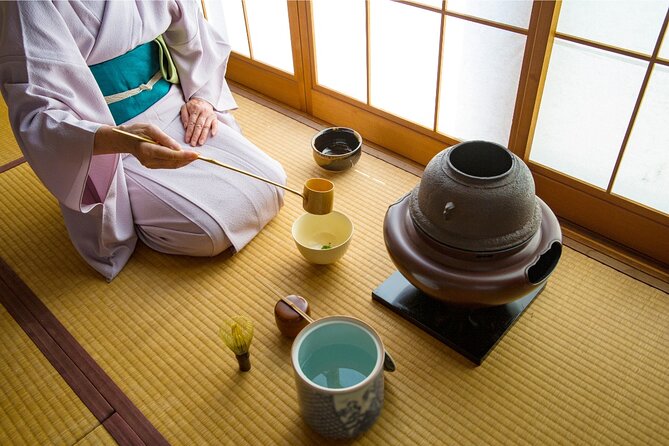
• Experience traditional Japanese culture by wearing a comfortable kimono and participating in a matcha tea ceremony in Tokyo’s Shinjuku district.
• Learn about the cultural importance of tea in Japan and enjoy a hands-on experience of making matcha the traditional way.
• Savor a refreshing cup of high-quality, seasonally prepared matcha paired with traditional Japanese snacks in a serene atmosphere.
• Enjoy the world of kimono and matcha, with guidance on etiquette and intricacies of kimono dressing and tea ceremony.
• Enjoy a fun and educational small-group experience in a convenient location, just a short walk from Shinjuku-Gyoen and Shinjuku-sanchome stations.
It's also worth checking out some other tours and experiences nearby.
Traditional Japanese Cultural Experience
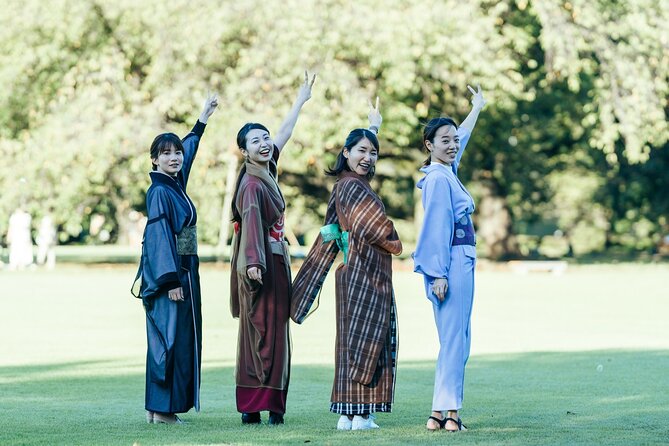
In this traditional Japanese cultural experience, guests explore the world of kimono and matcha, seeing the customs and traditions of Japan’s rich heritage.
They’ll start by getting changed into a comfortable, stylish, easy-to-wear kimono, perfect for the occasion.
Next, they’ll sit down for a presentation on tea, learning about the different varieties and their cultural importance in Japan.
Then, they’ll get hands-on experience making a bowl of matcha tea the traditional way, using the right tools.
Finally, they’ll enjoy drinking a refreshing cup of matcha tea, feeling like a true local.
This unique experience is the perfect way to connect with Japanese culture and create unforgettable memories.
Seasonal Matcha and Snacks Menu
Exclusive high-quality matcha is prepared seasonally to ensure the freshest flavors and aromas are showcased in every cup. This attention to detail allows participants to experience the full range of matcha’s nuances.
To complement the carefully crafted matcha, traditional Japanese snacks are prepared to pair perfectly with the seasonal matcha selection. These snacks are carefully chosen to enhance the overall matcha experience, with options changing throughout the year to reflect Japan’s distinct seasons.
Organic matcha is used to guarantee the best quality, and snacks are thoughtfully selected to provide a harmonious balance of flavors and textures. This thoughtful pairing ensures a truly immersive and delightful matcha experience.
What to Expect in the Workshop
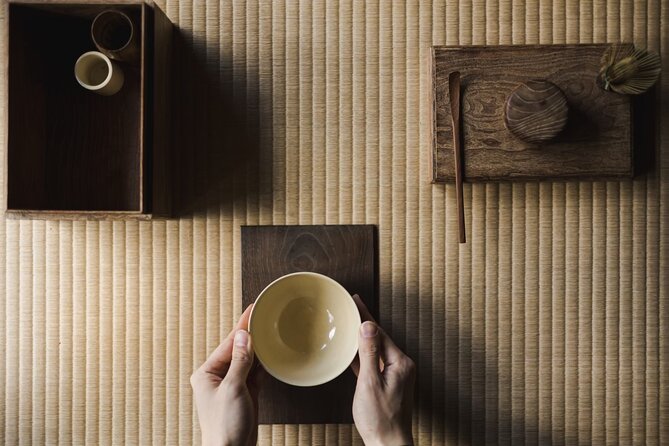
They’ll guide you through a fun small-group workshop in Shinjuku, where you’ll explore traditional Japanese culture.
You’ll start by getting changed into a comfortable, stylish, easy-to-wear kimono.
Next, you’ll sit down for a presentation on tea, learning about different varieties and their cultural importance in Japan.
Then, you’ll try making a bowl of matcha tea the traditional way with the right tools.
After that, you’ll enjoy drinking a refreshing cup of matcha tea.
Throughout the workshop, you’ll be immersed in traditional Japanese culture, and you’ll even get to enjoy some Japanese traditional snacks, prepared seasonally to complement the matcha experience.
Meeting and Getting Started
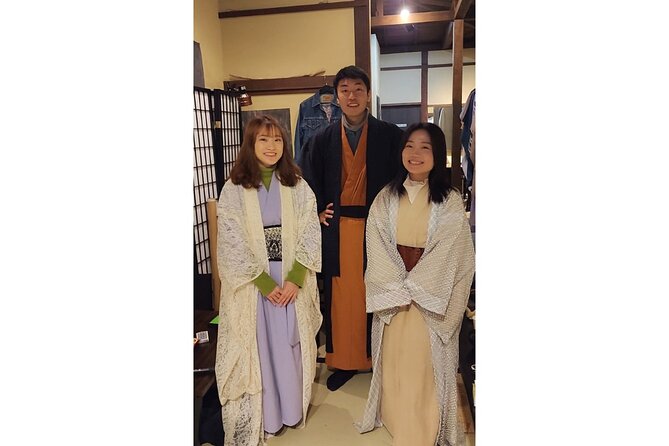
To get started, meet your guide at Dining Bar Call, located at 16-14 Tomihisachō, Shinjuku City, Tokyo 162-0067, Japan. This is where your unique matcha and kimono experience begins.
Once you arrive, you’ll head to the 2nd floor, where the workshop room is located. Before diving into the fun, take a moment to get familiar with your surroundings.
The meeting point is just a 7-minute walk from Shinjuku-Gyoen station and 8 minutes from Shinjuku-sanchōme station.
You’ll be returning to this meeting point at the end of the experience.
Don’t forget to wear socks, as they’re required in the tatami room.
With these details covered, you’re all set to embark on an unforgettable adventure in traditional Japanese culture.
Important Details to Note
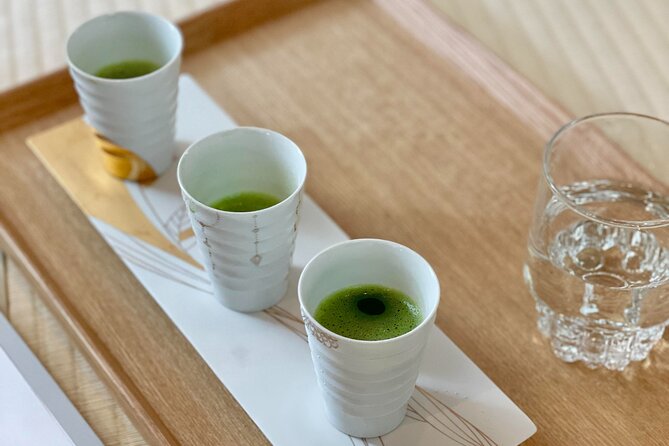
When booking this experience, confirmation is immediate, and it’s essential to review the details carefully to ensure a smooth and enjoyable journey into traditional Japanese culture.
Please note that this activity isn’t suitable for individuals with heart problems or serious medical conditions. Plus, the workshop room isn’t wheelchair accessible.
On a more practical note, socks are required in the tatami room, so don’t forget to wear or bring a pair.
The meeting point is conveniently located near public transportation, making it easily accessible.
Kimono and Tea Ceremony Essentials
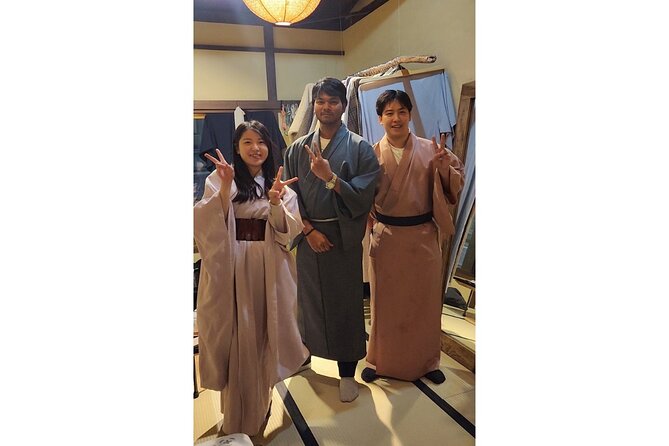
In traditional Japanese culture, the art of kimono dressing and the centuries-old tea ceremony are intertwined, with each element carefully curated to evoke a sense of harmony and respect.
When it comes to the kimono, the fabric, pattern, and design all hold significant meaning.
In a traditional tea ceremony, every detail is meticulously planned, from the ceramics to the utensils.
Kimono etiquette: Understanding the intricacies of kimono dressing, from the type of fabric to the way it’s tied.
Tea ceremony tools: Familiarizing oneself with the traditional utensils and ceramics used in the ceremony.
Respect for tradition: Embracing the centuries-old customs and rituals that make this experience so unique.
Enjoying Matcha the Japanese Way

Matcha enthusiasts and newcomers alike can indulge in the rich flavors and aromas of this iconic Japanese green tea, carefully prepared and savored in a tranquil setting.
As they sit down, they’re presented with a beautifully arranged traditional snack, carefully selected to complement the matcha experience.
The organic, high-quality matcha is prepared seasonally, ensuring the freshest and most vibrant flavors.
With each sip, the complex notes of the tea unfold, leaving a refreshing and uplifting sensation.
As they savor the tea, they can appreciate the serene atmosphere, surrounded by traditional Japanese decor, creating a truly immersive experience.
Preparing for the Experience
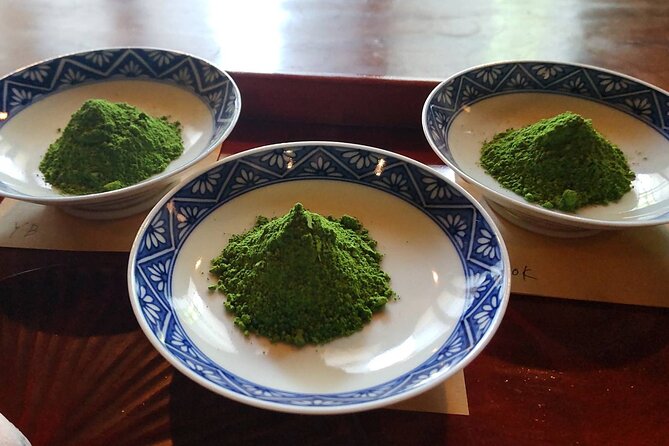
They’ll want to plan ahead for their Matcha and Kimono Experience by dressing comfortably in socks and layers, as the traditional tatami room can get quite cozy.
To ensure a seamless experience, it’s essential to prepare beforehand.
Dress comfortably: Wear layers and socks, as the tatami room can get warm.
Plan for transportation: The meeting point is a 7-minute walk from Shinjuku-Gyoen station and 8 minutes from Shinjuku-sanchome station.
Be prepared for a unique experience: Leave any expectations behind and come with an open mind to fully immerse in the traditional Japanese culture.
Here's a few more nearby tours and experiences we think you'll like.
- 3 Hours Photography and Food Tour in Setagaya
- 1 Day Bus Tour To Mitsumine Shrine From Shinjuku
- Bunraku Performance In Kita-Senju Tokyo
- Tokyo Tour With Guided Interpreter Tokyo/Yokohama ⇒ Tokyo 8 Hours up to 18 People Private Bus Use
- Tokyo Narita Airport (NRT) to Hakone – Private Arrival Transfer
- 4-Days Private MT Fuji Tokyo Kamakura Nikko Hakone Yokohama Tour
Frequently Asked Questions
Can I Wear My Own Kimono Instead of Renting One?
She wonders if she can wear her own kimono instead of renting one; unfortunately, it’s not allowed, as the provided kimono is specifically designed for the workshop’s ease and comfort.
Are There Any Vegetarian or Vegan Snack Options Available?
She confirms that traditional Japanese snacks are prepared seasonally, and while there aren’t specific vegetarian or vegan options listed, she recommends inquiring about potential adaptations or alternatives when booking the experience.
Can I Bring My Own Tea Ceremony Utensils or Tools?
She can’t bring her own tea ceremony utensils or tools; they’re provided as part of the experience, ensuring an authentic and hassle-free traditional Japanese tea ceremony experience.
Are Cameras Allowed During the Workshop and Tea Ceremony?
She can definitely take pictures during the workshop, but it’s best to ask the instructor before capturing the tea ceremony to ensure a respectful and peaceful experience for all participants.
Is the Workshop Suitable for Young Children or Babies?
She notes that the workshop isn’t suitable for young children or babies due to the delicate nature of the kimonos and traditional tea ceremony tools, requiring a certain level of maturity and attention span.
Not for you? Here's more of our most recent tour reviews happening neaby
- Shibuya Anime and Manga Tour With Ramen Lunch
- Shibuya Hidden Street Eats: Japanese BBQ, Fried Chicken, & More!
- Kitchenware Shopping and Cooking Experience in Kappabashi
- Private Shopping Tour From Tokyo to Mitsui Outlet Park Makuhari
- Samurai Experience (with Costume Wearing)
- Tokyo: Samurai Experience and Show
- Tsukiji Old and New – Fish Market Food & Hamarikyu or Skyview
- Private Shopping Tour From Tokyo City to Lake Town Outlet
- A Typical Evening in Shinjuku
- Tokyo Kimono Experience @Japanese-Style Studio Near by Happo-En
- Izakaya Private Hopping Tour in Kamata
- Explore Nikko Toshogu Shrine and Edo Wonderland
- Private Trekking Experience up to 7th Station in Mt. Fuji
- Private Transfer: Tokyo to Haneda Airport HND in Luxury Car
- Morning Discount! Shuttle Van Transfer, Tokyo⇒Haneda, Narita, TDL
Final Words
As she departs the Shinjuku workshop, she’ll carry with her a profound appreciation for traditional Japanese culture and a deeper understanding of the revered matcha tea ceremony.
With every moment of this immersive experience, she’s woven a rich tapestry of memories, from donning a stylish kimono to savoring the subtle nuances of matcha.
This unforgettable journey will linger, a testament to the power of culture and the beauty of Japan’s timeless traditions.
